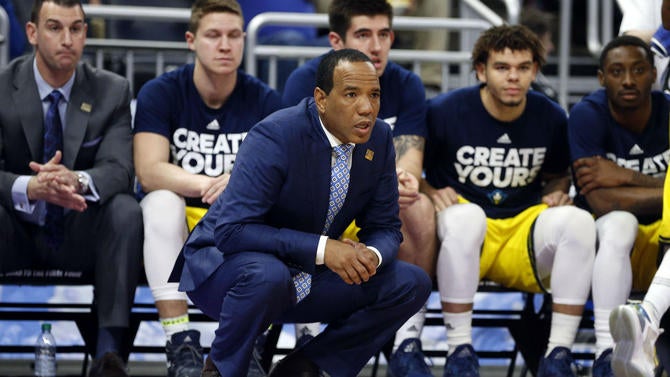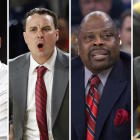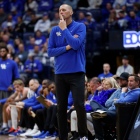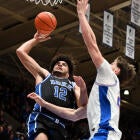Potential change to transfer rule has college coaches spooked, hypocritically
Why would allowing student-athletes the freedom to move freely be so terrible?

There is no indication anything is imminent or even in the process of being formally presented to the people who actually have the power to change NCAA rules. But that hasn't stopped college coaches from commenting on a report this week that members may someday vote to allow all Division-I transfers to be eligible to play immediately.
"How can you plan a roster or a team when every player is a free agent at the end of the season?" Alabama football coach Nick Saban asked Wednesday.
My answer: Probably pretty easily, if you're Nick Saban. I assume college football's best coach will be fine no matter what.
But that doesn't mean his larger point -- that, according to this possible proposal, student-athletes would essentially be free agents at the end of every season -- is factually incorrect. Theoretically, Saban is right. If football players and basketball players (and every other kind of player) were allowed to transfer from one Division I university to another and play immediately, it would essentially create free agency in those sports. But here's my question: Would that really be the worst thing in the world?
Obviously, most college coaches think so.
I've had conversations with many.
But, more often than not, these coaches are looking at the situation strictly from their perspective and stressing about how it could complicate their jobs. And here's what many either don't know or won't say: This possible proposal of allowing football players and basketball players to transfer and play immediately is already in place for most Division I sports. So if the football and basketball coaches genuinely have no idea how they could run their programs under these conditions, perhaps they should just ask the soccer coaches on their campuses for advice. The soccer coaches on their campuses have somehow been doing it for years.
Simply put, I'm for this.
And it's not because I don't think it would make the jobs of coaches more difficult; I know it would. It's just that I don't particularly care. Or, at least, I think the good outweighs the bad. More specifically, I'm not even sure the bad is that bad.
So what's the bad?
According to most coaches, the baddest bad is the likelihood that every player at the low-major and mid-major levels would be recruited by high-major programs once he proved himself worthy. But I'll ask again: Is that really the worst thing in the world?
Follow me here ...
What if it were somebody's dream to play in the ACC -- but he never got a chance coming out of high school because he either wasn't good enough or ACC coaches didn't think he was good enough? So he instead enrolls at Radford. And then he's awesome at Radford -- so much so that ACC coaches are suddenly convinced he can play at their level. As a result, Virginia, Miami and Clemson offer him the opportunity to fulfill a dream. So he then accepts an offer from ... Virginia. And now he gets to play for one of college basketball's best coaches, in a beautiful arena, while traveling in a first-class way and appearing on national TV basically every game.
Why is that the worst thing in the world?
Sounds kinda awesome to me.
It's a dream come true.
And it's not too different from how the coaching profession works.

Make no mistake, the overwhelming majority of low-major and mid-major coaches are currently at their schools for the exact same reason the overwhelming majority of low-major and mid-major players are currently at their schools -- i.e., because no high-major school wants them. But when they prove themselves capable -- like, for instance, Kevin Keatts spent the past three seasons doing at at UNC Wilmington -- they are often given the opportunity to move up and coach at the high-major level. And guess what they usually do? Move up and coach at the high-major level. And guess what they usually say? That it was an opportunity too good to pass up. And guess what we usually do? Totally understand.
I know coaches will point out that the difference between this possible proposal and their realities is that they have buyouts that double as punishments for leaving their schools. But let's be real: The list of low-major and mid-major coaches who have turned down high-major opportunities solely because of buyouts is pretty short, relatively speaking. And, lots of times, the coaches don't even pay their own buyouts; their new employer does. Beyond that, it's important to note that just because players could, under this plan, transfer and play immediately doesn't mean they would. I can't stress that enough. You know how some coaches turn down bigger opportunities every year? Some players would certainly do the same -- just because they might love their school or coach or teammates or girlfriend or any number of things. Perhaps I'll someday be proven wrong. But what I believe is that most players would stay right where they are -- especially the relevant players at relevant programs. So the idea that your favorite coach would be at risk of losing his whole team, or even half of his team, every offseason is an overstatement at best. At worst, it's a lie. Most players will not want to transfer even if given the opportunity to do so without penalty. That's the truth. And many wouldn't even be eligible to transfer without penalty because there would likely be a minimum academic component tied to the rule that a percentage of student-athletes probably would not meet. That's also the truth. And the proposal would likely stipulate that players can transfer without penalty only once -- meaning guys wouldn't just be bouncing from campus to campus year after year after year. That's also the truth.
Bottom line, the fact that job-jumping coaches are lamenting the possibility that student-athletes might someday be able to move around as freely as dozens of them do every year is pretty rich. It's hilarious, actually. Show me a coach who has rejected a bigger and better opportunity strictly because he was concerned about the negative impact it would maybe have on the school that gave him his first chance, and perhaps I'll listen to that guy. But I'm not even sure that guy exists. And that's why you'll forever have a hard time getting me to sympathize with multi-millionaire coaches at the expense of amateur student-athletes on this particular subject.
Yes, I understand this proposal could lead to players leaving one school at the first sign of adversity. And I understand tampering would run rampant. But the type of player who would leave one school at the first sign of adversity is already leaving one school at the first sign of adversity. And tampering is already rampant. So, sure, this proposal would likely escalate those issues, I acknowledge. But it's not like it would create issues that don't already exist in college athletics.
And if it did, again, I don't particularly care.
And it's not because I take any joy in watching people's jobs become more complicated. It's just that the possible good for the college player, in this case, would trump the possible bad for the college coach. And, either way, know this: Everybody would eventually adjust, college basketball would carry on, and the same schools that are great today would be great tomorrow. The landscape wouldn't change much, if at all. Duke would still be Duke. Kentucky would still be Kentucky. Kansas would still be Kansas. North Carolina would still be North Carolina. Arizona would still be Arizona. Michigan State would still be Michigan State. And the smaller schools looking up at them would still be the smaller schools looking up at them, same as it ever was.

















